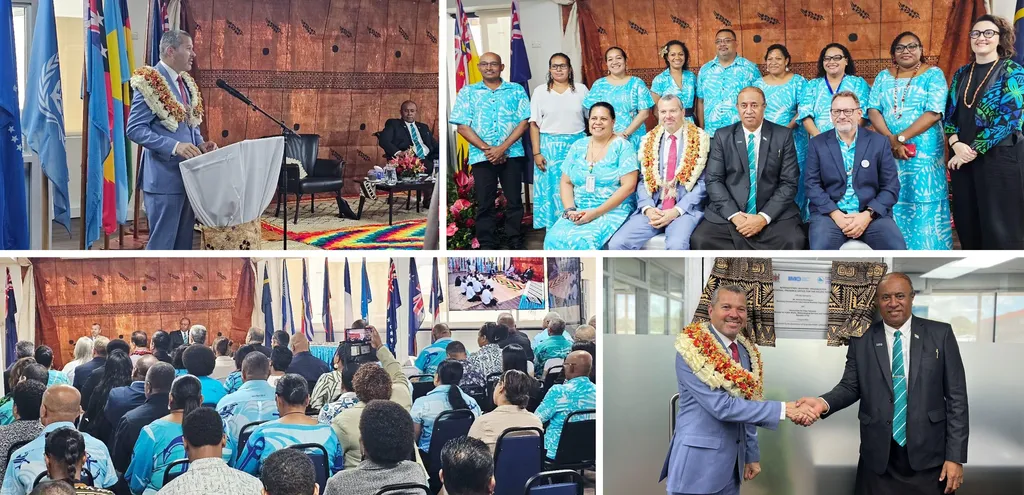The Pacific’s maritime future just got a game-changer. The International Maritime Organization (IMO) has planted its flag in Suva, Fiji, with the launch of its first-ever Regional Presence Office (RPO). This isn’t just another office—it’s a powerhouse for coordination, capacity-building, and cutting-edge maritime solutions tailored to the Pacific’s unique challenges.
For a region where maritime transport is the lifeline—not just for trade but for survival—this move is a big deal. “For the Pacific, maritime transport is more than just trade, it’s a lifeline,” said IMO Secretary-General Arsenio Dominguez at the opening. “This office will strengthen cooperation, build capacity, and ensure the region’s voice is heard on the global maritime stage.”
So, why Suva? The answer lies in the office’s mission. Nestled in the South Pacific Community’s (SPC) Lotus Building, this hub will drive maritime safety, sustainability, and decarbonisation across the Pacific. It’s not just about oversight—it’s about action. The office will coordinate technical assistance, support training, and help Pacific nations implement international maritime standards. Dominguez called it “a hub for efficiency, innovation and results,” underscoring the IMO’s long-term commitment to the region.
Fiji’s Minister for Public Works, Transport and Meteorological Services, Ro Filipe Tuisawau, echoed the sentiment, calling the timing “strategic.” With over 4,000 vessels operating in Fiji alone, maritime transport is the backbone of the economy. “This office will help us meet global obligations while addressing key challenges like decarbonisation and legislative reform,” he said.
But this isn’t just an IMO initiative—it’s a Pacific achievement. The Pacific Community (SPC) Deputy Director-General Paula Vivili pledged ongoing support, aligning the office’s work with regional priorities, including the Pacific One Maritime Framework. This framework is the blueprint for a unified, resilient maritime future for the Pacific.
The office’s establishment is the culmination of years of advocacy by Pacific Island countries, who have long sought stronger support for their unique maritime challenges—from rising sea levels to the need for cleaner, more resilient shipping solutions. The Suva-based RPO marks the first time the IMO has introduced a fully centralised technical cooperation model in the Pacific—a move both symbolic and strategic.
“This office brings global standards closer to those most affected,” said Dominguez. And that’s the real game-changer. By embedding the IMO’s expertise in the heart of the Pacific, the office ensures that global maritime standards aren’t just imposed but co-created with the region’s needs in mind. It’s a model that could redefine how the IMO engages with other regions, putting local voices at the centre of global maritime governance.
The Pacific’s maritime future just got a game-changer. The International Maritime Organization (IMO) has planted its flag in Suva, Fiji, with the launch of its first-ever Regional Presence Office (RPO). This isn’t just another office—it’s a powerhouse for coordination, capacity-building, and cutting-edge maritime solutions tailored to the Pacific’s unique challenges.
For a region where maritime transport is the lifeline—not just for trade but for survival—this move is a big deal. “For the Pacific, maritime transport is more than just trade, it’s a lifeline,” said IMO Secretary-General Arsenio Dominguez at the opening. “This office will strengthen cooperation, build capacity, and ensure the region’s voice is heard on the global maritime stage.”
So, why Suva? The answer lies in the office’s mission. Nestled in the South Pacific Community’s (SPC) Lotus Building, this hub will drive maritime safety, sustainability, and decarbonisation across the Pacific. It’s not just about oversight—it’s about action. The office will coordinate technical assistance, support training, and help Pacific nations implement international maritime standards. Dominguez called it “a hub for efficiency, innovation and results,” underscoring the IMO’s long-term commitment to the region.
Fiji’s Minister for Public Works, Transport and Meteorological Services, Ro Filipe Tuisawau, echoed the sentiment, calling the timing “strategic.” With over 4,000 vessels operating in Fiji alone, maritime transport is the backbone of the economy. “This office will help us meet global obligations while addressing key challenges like decarbonisation and legislative reform,” he said.
But this isn’t just an IMO initiative—it’s a Pacific achievement. The Pacific Community (SPC) Deputy Director-General Paula Vivili pledged ongoing support, aligning the office’s work with regional priorities, including the Pacific One Maritime Framework. This framework is the blueprint for a unified, resilient maritime future for the Pacific.
The office’s establishment is the culmination of years of

